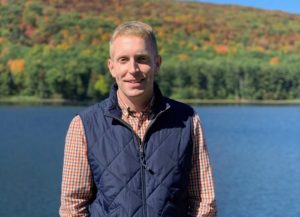PROVINCETOWN — Alex Morse will have been mayor of Holyoke for just over nine years when he resigns at the end of March to take up his new job as town manager in Provincetown on April 5. His salary of $185,000 comes with a housing allowance of $15,000, according to his three-year contract.
Morse has been elected mayor four times, and first took office at the age of 22. He’s now 32. He ran a losing primary challenge for a Congressional seat last August. He told the Provincetown Select Board in his interview last month that these election campaigns were part of why he wanted to be town manager.
“I’ve done a lot of soul searching over the last six months, since losing the primary,” Morse said. “I’ve had to run for mayor four times. Every time, it’s spending time raising money, doing political things, when I really just want to govern and do what I enjoy and excel at, which is the mechanics of an urban community, the actual meat and potatoes that go into governing.”
Morse is hopeful about the job in Provincetown because “local government is where a lot of the action is,” Morse told the Independent.

He learned that early on, he said. “Growing up in a place like Holyoke, it’s hard not to notice the forces at play. From pre-K through fifth grade, I went to school in the poorest neighborhood, and I was bused there. Some kids get off the bus and have a huge house to come home to, and some have not much to go home to. You’ve got a largely dead downtown, poverty and racism, empty paper mills.
“At the end of seventh grade, I heard an announcement about a group called the Holyoke Youth Commission,” he went on. “That was my introduction to civics and government.” He remembers making a “youth vision map” of changes they wanted to see. “We met with the mayor, and a lot of other organizations,” he said. “Eventually we got grant money and distributed it to other youth groups. It was a very powerful experience.”
Morse’s organizing efforts turned more personal after he came out as gay at 16, he said. He started a gay/straight alliance at his high school and partnered with a local nonprofit to organize an alternative prom for LGBTQ students in the region.
“Five hundred kids came to Holyoke for that alternative prom, and they could dress how they wanted to dress, bring who they wanted to bring, express their gender however they wanted,” said Morse. “That was the spring of 2007. A lot of older queer people were the chaperones, and I think it was almost as emotional for them as it was for the students.”
Morse was the first person in his family to go to college. “My parents grew up in public housing,” Morse told the select board at his interview. “My dad still works at the same factory he worked at 35 years ago. Where I grew up, people didn’t know how to access city government.”
Making the workings of government transparent was a theme in Morse’s interview. “I want to democratize how we make decisions, and promote debate and discussion,” Morse said. “Dissent is something I’ve always valued and encouraged.”
“If people feel disconnected from the process, it’s very difficult to achieve progress,” Morse later told the Independent. “You have to make sure residents know of the key points at which their voice is most likely to make a difference.
“Here in Holyoke, it’s not rare to do town halls on particular topics,” he added. “We’ve tried to shift the narrative from ‘you need to come to us,’ to ‘we’re going to meet people where they’re at.’ ”
Which means a question he’ll be asking early in his tenure here will be “What are those venues where people congregate? — those are the places we need to seek out and make sure there’s a two-way connection.”
Morse told the select board that his greatest achievement in Holyoke was diversifying who participates in government, who works in government, and who runs for office.
“At the end of the day what I’m most proud of is opening up the doors of city hall,” Morse said. “When I took office only 8 percent of our various boards were people of color, in a city that’s 50 percent Latino. We got that to over 40 percent. Fifty percent of our department heads are now women. People I’ve appointed to parks and rec, or to the planning board, have gone on to run for office.”
All of that, Morse believes, is the result of people feeling that they know how to get involved.
When it comes to housing, Morse told the Independent he knows “we have a lot of work ahead of us. I want to take a pretty big-picture look at the available space and figure out how do you provide affordable housing when there’s not enough land. I do have experience over the last 10 years bringing in 500 units of new housing to Holyoke, everything from public housing to affordable to market-rate. I know the ins and outs of state funding, and leveraging tax credits, and things we can do on the local level to incentivize those kinds of developments.
“It’s too early to talk about a specific plan, but I’m really excited to get to work.”



